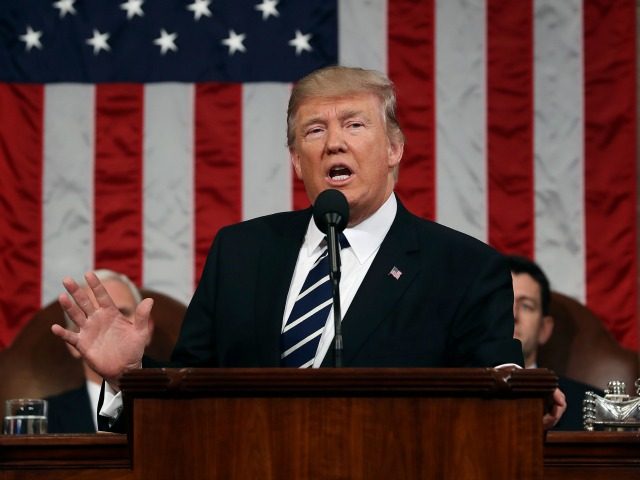Chinese state-run publication Global Times warned on Tuesday that President Donald Trump was leading the United States into “political chaos,” making the expansion of globalization – and international Chinese influence – necessary for global stability.
The newspaper published this editorial hours before President Trump gave his first address to a joint session of Congress, a speech heralded by partisans from both sides of the aisle as unifying and confidence-boosting.
In a column titled “U.S. Political Chaos Reveals Urgency to Advance Globalization,” the Global Times argues that opposition to Trump’s presidency around the world “could be an opportunity to gather global forces together to advance globalization.”
“Trump’s election was driven by voters’ anger and frustration against elitism and globalization, and he was elected in the hope of bringing back manufacturing jobs and improving people’s livelihoods,” the column notes. “However, the new president has stumbled from one mess to another. There is no clear sign how Trump can unite the country to ‘make America great again,’ and the harsh reality is that the country is even more polarized and divided than ever before.”
“If we cannot expect the US to play an active role, other global powers, including China, should enhance coordination to promote globalization and multilateralism and establish a new order of global governance,” the column concludes.
The Global Times published another article this week warning against letting President Trump keep his position as the leader of the developed world, claiming that “the U.S. is becoming an unpredictable country.”
“Trump’s presidency has just started to stir up turbulences in the world. Predictability is the basis of order; however, Trump has used unpredictability as a policy tool. Many within Trump’s inner circle have a zero-sum mentality. Their mindset is very dangerous and seems very ‘un-American,'” the Times argues.
While President Trump’s short tenure has had its share of controversy, Tuesday proved to be an unfortunate time to make the argument that China should take on the superpower role traditionally held by the United States. President Trump delivered a joint address to Congress in which he emphasized the need to address the issues of the black community, cooperate with “our friends and allies in the Muslim world” against the Islamic State, and delivered a heartfelt tribute to the wife of a Navy SEAL recently killed in an operation in Yemen. That last moment elicited praise from the likes of far-left CNN commentator Van Jones, who said Trump “became president of the United States” during this speech and called the tribute “one of the most extraordinary moments you have ever seen in American politics, period.”
The Global Times has not published any articles about Trump’s Tuesday night address. Instead, the more straight-reporting Chinese media outlet Xinhua wrote an article summarizing his speech as a “message of unity and strength” but claiming that “reactions to his address are deeply divided if not as polarized as expected.”
Xinhua also published a story promoting greater cooperation between the United States and China, apparently a rebuttal to the Global Times‘ aggressive rhetoric describing America as an empire in decline. Xinhua reported that conversations between State Councilor Yang Jiechi, the highest-ranking Communist Party official to visit Washington since Trump assumed the presidency, were largely positive. “Guided by the spirit of the conversation, the two sides have enhanced all-level communication and coordination, and affirmed the importance of a constructive bilateral relationship,” Xinhua reported. Yang is visiting the United States on the 45th anniversary of President Richard Nixon’s historic visit to China.
The Chinese Communist Party has invested heavily in promoting globalization, which would grant China a larger international footprint at the expense of the United States. President Xi Jinping personally delivered a speech before the World Economic Forum in Davos earlier this year warning against nationalism and populism, arguing that strengthened nation-states are “not good for closer economic cooperation globally.”

COMMENTS
Please let us know if you're having issues with commenting.